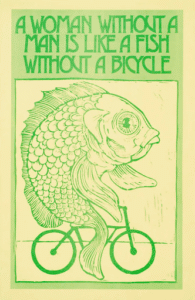
In 1970 a feminist leader proclaimed “A woman without a man is like a fish without a bicycle.” That statement provided one of many catalysts for an ongoing proliferation of discussions, heated arguments and political activism regarding gender.
I became a Jesus follower in 1970. I was single and remained single for the next 19 years. I have been married for the last 36 years. So I’ve had a keen interest in how Christians interpret marriage and gender roles. I’ve also noted that, although most Christians marry, Jesus and the Apostle Paul were single and commended those who remain single to further the Kingdom of God.
Over time, cultures have observed rather settled gender and marriage roles. Those heavily influenced by observant Christians and Jews often consider Genesis 2 and 3 the gold standard to guide male/female relationships. Interpretation of pivotal verses is heavily influenced by translation methods applied to certain words.
As we probe God’s thinking and purposes in creating differences in humans, let’s explore five English translations of the Hebrew words ezer kenegdo in
Genesis 2:18, moving from an earlier to later translations.
And the LORD God said, It is not good that the man should be alone; I will make him an help meet for him. Genesis 2:18 KJV
Now the LORD God said, “It is not good (beneficial) for the man to be alone; I will make him a helper [one who balances him—a counterpart who is] suitable and complementary for him.” Genesis 2:18 AMP
Then the LORD God said, “It is not good for the man to be alone; I will make him a helper suitable for him.” Genesis 2:18 NASB
The LORD God said, “It is not good for the man to be alone. I will make a companion for him who corresponds to him.” Genesis 2:18 NET
Then the LORD God said, “I see that it is not good for the man to be alone. I will make the companion he needs, one just right for him.”
Genesis 2:18 ERV
A word search of the Old Testament divulges that the word ezer appears 21 times. Genesis 2 applies it to the woman twice. Three other times it’s applied to nations who helped Israel in battle. The remaining sixteen occurrences describe God as a “helper” to his people.
Some contemporary scholars now lean toward the idea of translating ezer in Genesis 2 as “strong ally”. The implication is that Adam needed another human (it wasn’t good for him to be alone), as a variation of himself who would contrast or stand counter to him for his benefit.
Because the original New Testament was written in Aramaic or Greek, the exact term ezer is unavailable for New Testament word study. But in John 14:16, 15:26 and 16:7, Jesus uses a word variously translated “helper, advocate, or counselor” in describing the Holy Spirit.
The overall insight gained from examining the term ezer is that God’s human design begun in Genesis 2:7 wasn’t as complete a description as the one in Genesis 1:27. Adam wasn’t created to be an independent being, forever making singular decisions on important life issues. Interaction with a counterpart committed to his welfare wasn’t to be a battle but a source of welcome input and support.
Do you hesitate to “interfere” with your spouse or another believer when they embark on a potentially destructive path? Do you resist legitimate concern from your spouse or other believers when moving forward with significant actions? Regardless of your marital status, refresh the “it isn’t good for man to be alone” approach to your decision making.
Further thoughts on ezer kenegdo: two viewpoints here and here. If you are super ambitious and love mind benders go here.
by Kathleen Petersen

